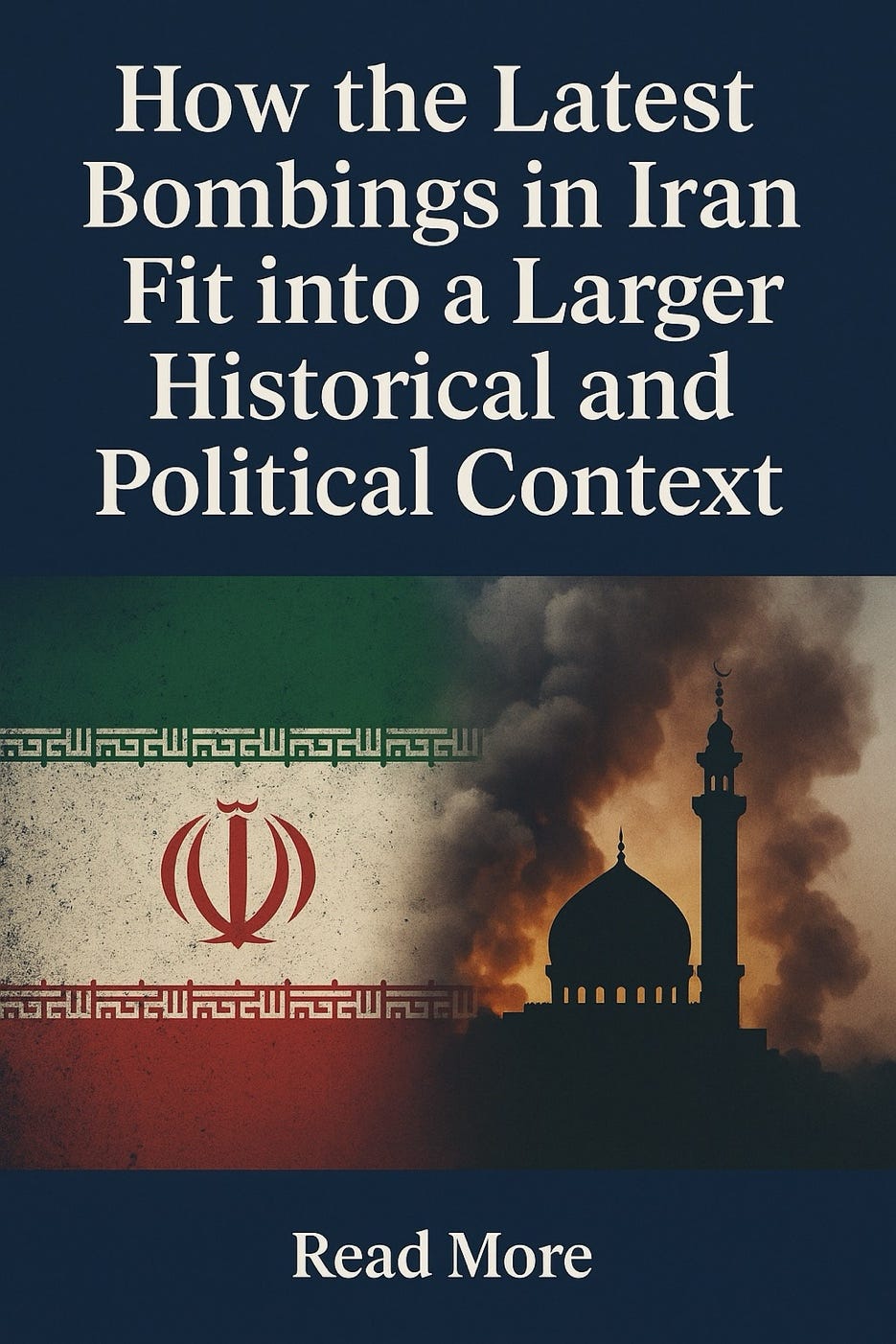Our bombings of Iran in the last few days have thrust that nation back into the headlines—provoking Iran, pleasing Netanyahu, and shifting the political narrative in both the U.S. and Israel.
There’s an old adage: “If your presidency is in trouble, start a war.”
It’s effective. It dominates the news, distracts from domestic troubles, ignites patriotism, grants emergency powers, justifies massive military spending—and gives us a new enemy to demonize.
And as always, historical context vanishes. Perspective is lost.
Over the years I facilitated a Great Decisions foreign policy group, I found that history was the most essential missing ingredient in most public conversations. Without it, we fall victim to narratives that serve power, not understanding.
(Great Decisions is the nation’s largest civic education program on international affairs. Sponsored by the Foreign Policy Association, it brings people together in local discussion groups to explore critical global issues. Each group uses a briefing book and video series to guide thoughtful, nonpartisan conversations on topics like climate policy, global conflict, and international relations. It’s a powerful way for citizens to stay informed and engage in meaningful dialogue about the world.)
A Brief History of Iran—and Our Role in It
Iran, known as Persia until 1935, maintained sovereignty for centuries despite external pressures. But the control of its oil by the Anglo-Iranian Oil Company (later BP) remained a sore point.
In the early 20th century, Iran developed a constitutional monarchy. But in 1921, Reza Khan staged a coup and later crowned himself Shah, founding the Pahlavi dynasty. In 1941, with World War II raging and suspicions of his pro-German sympathies, Britain and the USSR forced his abdication. His son, Mohammad Reza Shah, assumed power.
Then came Prime Minister Mohammad Mossadegh, who sought to reclaim Iran’s oil for its people. The U.S. and Britain responded with the infamous 1953 CIA/MI6 coup, reinstating the Shah and beginning decades of authoritarian rule supported by U.S. aid and enforced by the brutal secret police, SAVAK.
Religious leaders filled the vacuum of resistance—one of the few forums not banned by the Shah. This gave rise to the 1979 Islamic Revolution, with Ayatollah Khomeini returning from exile to establish a theocratic government.
The Hostage Crisis, Reagan’s Inauguration, and the Iran–Iraq War
The revolution led to the Iran Hostage Crisis, with 52 Americans held in Tehran for 444 days. President Carter’s re-election suffered deeply. Though the hostages were released as Reagan took office, allegations persist that Reagan’s campaign sought to delay that release—an echo of Nixon’s 1968 Vietnam peace delay.
In the 1980s, the U.S. backed Iraq in its brutal war against Iran, despite Iraq’s use of chemical weapons. Yet paradoxically, the U.S. also sold arms to Iran through Israeli intermediaries, secretly funneling proceeds to the Nicaraguan Contras in what became the Iran–Contra Affair.
Iran emerged from the war isolated and damaged.
Reform, Repression, and Broken Deals
· Khatami (1997–2005) tried to open to the West.
· Ahmadinejad (2005–2013) reversed that course with hardline policies and renewed nuclear development.
· Rouhani (2013–2021) negotiated the 2015 Iran nuclear deal, which lifted sanctions in exchange for nuclear constraints.
· In 2018, Donald Trump withdrew from the deal. Iran, again isolated, faced crushing sanctions and increasing tensions.
· In 2020, a U.S. drone strike killed a top Iranian general.
· Then came President Raisi, a hardliner, as Israel escalated covert attacks. Iran retaliated.
· And now the U.S. has entered with direct bombings—an act of war without Congressional approval.
What This All Means
· Donald Trump continues to act as if he alone can decide U.S. foreign policy.
· Israel, under Netanyahu, exerts massive influence over American policy.
· Trump supports not just Israeli policy in Gaza, but its broader Middle East campaigns.
· Iran, weakened by sanctions and abandoned diplomacy, is now being pushed toward regime change—again.
· Peace overtures by Iran have been ignored, while false narratives of nuclear threat justify continued pressure.
· And yes, oil remains a strategic factor.
· Perhaps we still resent Iran for rejecting our Shah and his SAVAK. Are we preparing to reinstall another puppet regime?
· We pretend this has nothing to do with racism, religious bias, or imperial memory. But it does.
· And as always, we forget international law.
· We ignore our own Constitution.
And now we’re strapped in for the next ride.
Ask Yourself:
Do we want to humiliate Iran because they dared to reject our dominance?
Because they support the Palestinians?
Because they don’t bow to our chosen allies?
This looks a lot like wounded national ego—and vengeance masquerading as policy.
Many of us thought we were better than this.
These patterns—unilateral military actions, suppression of historical context, manipulation of public fear—are part of a larger democratic crisis. In my new book Saving Democracy: From the Warnings of 2016 to the Urgency of 2025, I explore how we got here and why reclaiming constitutional checks, informed citizenship, and international integrity is urgent in 2025. Iran is not just a foreign policy flashpoint—it’s a mirror of our own democratic decay.
📘 This article builds on themes from my new book, Saving Democracy: From the Warnings of 2016 to the Urgency of 2025—a reflection on how we’ve lost democratic guardrails and how we might recover them. Learn more on my website: www.perspectives-bobpassi.org. The book is also available on Amazon: https://a.co/d/9Ynia14.








https://open.substack.com/pub/mdavis19881/p/the-increased-nuclear-threat-after?r=19b2o&utm_medium=ios